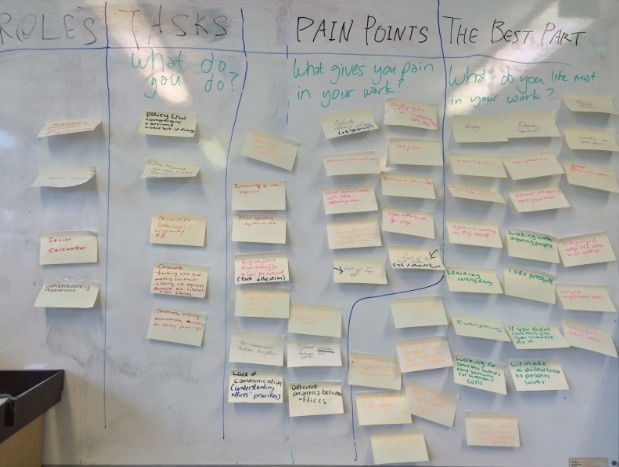Exploring MPs' digital capability
In 2015, we ran a survey, did interviews and reviewed MPs websites to understand how widespread digital skills and confidence were among our representatives in Parliament.
Putting in place a mentoring approach
We then spoke to MPs and to the Parliamentary Digital Service who contributed to setting up a digital mentoring project to explore the difference we could make. In 2016, we recruited four digitally and politically savvy mentors to work with us for three months. Between May and July, they spent 10 weeks in MP’s offices working four days a week in Parliament and constituency offices, and one day a week with Doteveryone reviewing progress. They spent four additional weeks at Doteveryone, exploring the issues and documenting the findings.
Understanding the wider landscape
The mentors started with a week at Doteveryone hearing how technology is used by MPs and citizens in meetings with the Parliamentary Digital Service, the House of Commons social media and libraries staff, Nesta, Demos, Democracy Club, Open Data Institute, MySociety, the Institute for Government and other organisations. This helped to create a broad view of the potential role of technology and what the mentors could expect during their placements.
Delivering mentoring and understanding needs

We ran workshops, used posters to capture feedback and showed teams new ways of working. The mentors explored all aspects of an MP’s working life to understand the challenges and opportunities including:
- getting to grips with how the office uses the internet (including the MP’s website), open data and technology in operations, casework, communications (email and social media), campaigns, outreach, understanding data and thinking about legislation
- understanding where MPs face challenges or problems or where internet technologies are not being exploited
- challenging current thinking within the MP’s team about how best to fulfil MP functions using internet technology
The mentors also interviewed and surveyed constituents to understand their views of the MP’s role and the potential for digital technology.
Measuring the impact on the offices
To understand the impact of the mentoring approach, we used a digital skills questionnaire with staff at the start and end of the placements, supplementing this with MP and staff interviews. The mentors also worked with the MP and their staff to give feedback on a social listening tool developed by the Demos Centre for Analysis of Social Media. This tool provides access to a dynamic understanding of issues and information being discussed by the public in their constituencies.
Examining common themes and issues

The mentors collaborated daily on Slack and weekly in Google Hangouts to share learning and work in progress. Half way through the placements, mentors returned to Doteveryone to examine the common themes and issues. A staff member from one of the MP’s teams contributed to a workshop to capture the user needs of both citizens and staff working in the MP’s office.
We shared our progress and findings with the organisations who took part in the induction week and used their input to help shape the best use of the mentors’ remaining time.
We also met other MPs, political party representatives and software suppliers to help us form recommendations for change and ensure wider impact.
This report shares the findings and recommendations of our work.